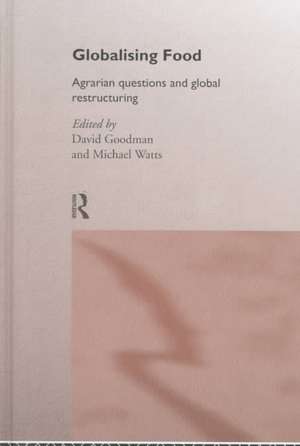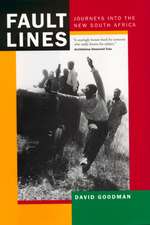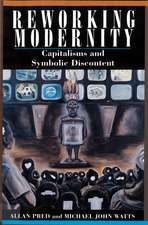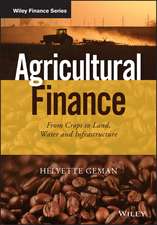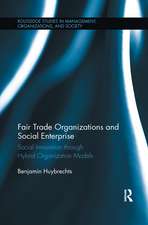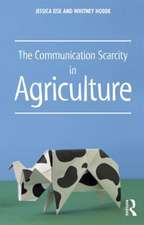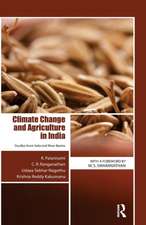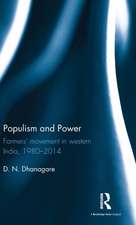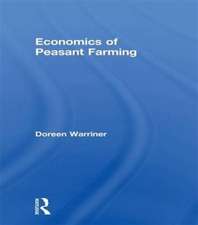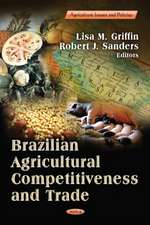Globalising Food: Agrarian Questions and Global Restructuring
Editat de David Goodman, Michael Wattsen Limba Engleză Hardback – 23 oct 1997
The book draws on new theoretical perspectives and wide-ranging case studies from Britain, the USA, India, South Africa, New Zealand and Latin America. The key themes addresses range from giant multinational food corporations, rural industrialisation and World Bank policies, to the regulation of pollution, labour relations, urban food politics and environmental sustainability. Globalising Food offers important insights into the problems, consequences and limits of the industrialisation of agriculture and the provisioning of food in a global world as we approach the new millenium.
| Toate formatele și edițiile | Preț | Express |
|---|---|---|
| Paperback (1) | 437.52 lei 6-8 săpt. | |
| Taylor & Francis – 23 oct 1997 | 437.52 lei 6-8 săpt. | |
| Hardback (1) | 1336.81 lei 6-8 săpt. | |
| Taylor & Francis – 23 oct 1997 | 1336.81 lei 6-8 săpt. |
Preț: 1336.81 lei
Preț vechi: 1630.25 lei
-18% Nou
Puncte Express: 2005
Preț estimativ în valută:
255.79€ • 267.07$ • 211.71£
255.79€ • 267.07$ • 211.71£
Carte tipărită la comandă
Livrare economică 04-18 aprilie
Preluare comenzi: 021 569.72.76
Specificații
ISBN-13: 9780415162524
ISBN-10: 0415162521
Pagini: 400
Dimensiuni: 156 x 234 x 28 mm
Greutate: 0.74 kg
Ediția:1
Editura: Taylor & Francis
Colecția Routledge
Locul publicării:Oxford, United Kingdom
ISBN-10: 0415162521
Pagini: 400
Dimensiuni: 156 x 234 x 28 mm
Greutate: 0.74 kg
Ediția:1
Editura: Taylor & Francis
Colecția Routledge
Locul publicării:Oxford, United Kingdom
Public țintă
Postgraduate and UndergraduateRecenzii
'Globalising Food is a significant contribution to a new radical critique of globalization.' - Tim Lang, Times Higher Education Supplement
'This book is an important and valuable contribution to the study of food and agriculture.' - Environment and Planning
'Presenting rich empirical accounts of so many geographic regions and extending theoretical debate ... this is a wonderful edited collection which will undoubtedly prove invaluable to researchers working in the areas of critical geography, political economy and international development.' - Economic Geography Research Group
'This book is an important and valuable contribution to the study of food and agriculture.' - Environment and Planning
'Presenting rich empirical accounts of so many geographic regions and extending theoretical debate ... this is a wonderful edited collection which will undoubtedly prove invaluable to researchers working in the areas of critical geography, political economy and international development.' - Economic Geography Research Group
Cuprins
1: Agrarian Questions; I: Institutions, Embeddedness and Agrarian Trajectories; 2: Regional Integration and the Family Farm in the Mercosul Countries; 3: Multiple Trajectories of Rural Industrialisation; 4: Agrarian Questions in the Making of the Knitwear Industry in Tirupur, India; I: Commentary On Part I; II: Restructuring, Industry and Regional Dynamics; 5: Restructuring National Agriculture, Agro-Food Trade, and Agrarian Livelihoods in the Caribbean; 6: Restructuring Pork Production, Remaking Rural Iowa; II: Commentary On Part II; III: Globalisation, Value and Regulation in the Commodity System; 7: Creating Space For Food; 8: Agro-Industrial Just-In-Time; III: Commentary On Part III; IV: Discourse and Class, Networks and Accumulation; 9: Legal Discourse and the Restructuring of Californian Agriculture; 10: Field-Level Bureaucrats And The Making Of New Moral Discourses In Agri-Environmental Controversies; IV: Commentary On Part IV; V: Transnational Capital and Local Responses; 11: Nourishing Networks; 12: Reopening Totalities; V: Commentary On Part V; VI: Nature, Sustainability and the Agrarian Question; 13: Sustainability And Theory; 14: Some Observations on Agro-Food Change and the Future of Agricultural Sustainability Movements; VI: Commentary On Part VI
Descriere
Explores the increasing industrializiation of agri culture throughout the world and the changing inte rnational divisions of labour that result as new commodities and new suppliers emerge.
